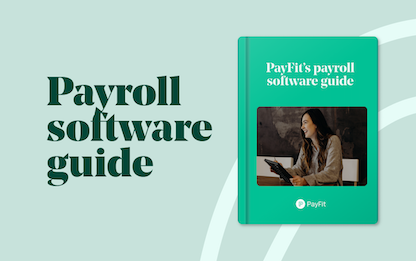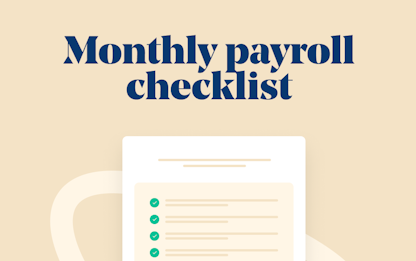- Blog
- |People management
- >Salaries & Benefits
- >Over and underpayments
How can over and underpayments still be possible?


When it comes to payroll over and underpayments, there is always one party that loses out.
For employers, overpaying employees means a potential financial loss, possible legal implications when reclaiming the funds and an awkward conversation explaining why the money will have to be returned.
For employees, an underpayment can be even more damaging. With bills to be paid, payroll underpayments can lead to some extremely serious consequences.
But in the 21st century, when so much can be automated and managed through modern technology, how can over and underpayments still be possible?
We look at the leading causes, impact, law and regulations, and how over and underpayments can be avoided.
Leading causes of over and underpayments
There are several reasons why someone may be under or overpaid. One of the main reasons can usually be linked to administrative errors where information is either incorrectly recorded or submissions are made after a cut-off point.
For example, late submissions of unpaid absences could result in an employee being overpaid for a particular period of time. Equally, an ex-employee who has just left a company may receive payment for time that they have not worked if their departure was incorrectly processed or finalised too late.
Other causes for both under and overpayments are manual calculations. Many businesses continue to run their payroll manually, resulting in errors being unintentionally made. For example, suppose an employee is scheduled to work 35 hours in a particular week, yet the person recording payroll makes an error and records fewer hours. In that case, that employee will receive an underpayment in their payroll.
Finally, one of the more serious cases of underpayment can occur when an employer fails to pay their employees the minimum wage they are entitled to.
The UK's National Minimum Wage (NMW) is dependent on an employee's age and role. For example, apprentices are entitled to earn a minimum of £4.30 an hour, whereas a full employee aged 23 and above is entitled to a minimum wage of £8.91 per hour.
UK National Minimum and Living Wage rates
UK NMW and NLW rates.
| 23 and over | 21-22 | 18-20 | Under 18 | Apprentice |
|---|---|---|---|---|
| £8.91 | £8.36 | £6.56 | £4.62 | £4.30 |
Companies that fail to comply with these minimum wage rules are underpaying their employees and breaking the law. Not only do they leave their employees facing potential hardships, but they can also leave themselves exposed to sanctions by HMRC.
Over the last few years, HMRC has cracked down heavily on companies that exploit workers through non-compliance with minimum wage regulations. They have even released a "naming and shaming" list, including the names of companies that have consistently failed to pay their employees the correct amount.
Impact of payroll over and underpayments
Overpayments
Employers
Overpaying employees is a situation that no company ever wants to find itself in.
Apart from the obvious financial loss incurred, worryingly, overpayments aren't always identified straight away. This can mean that companies may be unwittingly paying their employees more than they are supposed to for a significant time before realising.
So, what happens if an overpayment has been made to an employee?
Well, the employer has the right to reclaim the money back.
Yes, as awkward as that conversation may be, an employer can request overpayments to be paid back to them.
While employees and workers are protected from unlawful deductions from their wages in the Employment Rights Act 1996, there is an exception relating to the case of an overpayment and allows employers to make a deduction and correct errors.
Often, employers insert a clause in employee contracts stipulating that, in the event of an overpayment, deductions can be made from their salary.
If an overpayment has taken place, but the affected employee has left the company, an employer still has a right to reclaim overpaid wages.
Generally, this can be done in the form of an informal request to the ex-employee, and, in most cases, the matter can be resolved quickly and effectively.
However, if the former employee refuses to comply with the request, the employer can explore legal avenues.
The success of any case will depend on the ex-employee's financial circumstances, and employers will also need to investigate the cost of any associated legal fees and whether it is worth pursuing the issue through the courts.
If the ex-employee refuses, an employer can investigate legal options. However, the implications of this and the effort involved can be greater than the sum of money the employer intends to claim back from the employee.
Did you know?
Although no employer wants to find themselves making payroll errors, 90% of employers using the Coronavirus Job Retention Scheme made payroll errors each month in 2020. Source: Personnel Today
Employees
From an employee's perspective, overpayments may seem great. After all, and providing the employer never realises the problem, surely an overpayment would simply mean receiving more money?
Well, not exactly.
Nearly all companies will have wording written into employment contracts and employee handbooks stipulating that employees are required to check their wages and payslips and raise attention to any potential overpayments.
Failure to alert employers to a possible overpayment could, in some cases, constitute a breach of contract which could lead to disciplinary action and even dismissal.
Consequently, it is within the best interest of all parties for any instances of overpayment to be managed and dealt with swiftly.
Did you know?
A survey by the Workforce Institute revealed that 49% of workers would start searching for a new job after experiencing just two problems with their pay cheque. Source: HRDive
Underpayment
Employers
There is often an incorrect assumption that overpayments only impact the employer themselves. In fact, employees can also lose out as a result of receiving an overpayment. Employees who claim Universal Credit can be particularly impacted by receiving an overpayment as it may result in them losing their Universal Credit payment.
Because Universal Credit is calculated using information gathered from RTI submissions, an overpayment could trigger the payments to be stopped and leave the affected employee facing a cash shortfall further down the line.
Underpaying employees also has serious consequences to employers both internally and externally.
While some instances of underpayment may be entirely accidental — e.g. an employee's salary changes but the information isn't properly processed, or there's an error in calculating salary that results in an employee not receiving what they're owed — employers ought to try and take the necessary measures to ensure that these occurrences are kept to a minimum.
From an internal perspective, underpaying employees is likely to cause a significant strain between the company and its staff; however, it's the company's reputation that can really be damaged.
Big names such as Pizza Hut, Superdrug and even Tesco have fallen foul of minimum wage rules in recent years and have left their employees facing significant underpayments.
As stated earlier, HMRC takes a very dim view of companies who fail to pay their employees the correct amounts and has released a "naming and shaming" list to try and deter companies from making the same mistakes again.
Employees
Employees not receiving the money they're entitled to are likely to feel demotivated to perform their job to the required standard, undervalued by their employer and, in some cases, even quite resentful.
More seriously, underpaying employees could lead to them being left in a position of financial difficulty.
Research by the Money and Pensions Service showed that 11.5 million Britons have less than £100 in savings at any given time. This worrying stat demonstrates just how few working adults have money that they can fall back on in times of crisis.
For employees in situations like this, receiving underpayment of salary or wages could leave them struggling to pay their bills, rent, mortgage or, in some cases, put food on the table for them and their family.
When it comes to paying employees, what does the law say?
Overpayments
In instances where an overpayment has taken place, employers need to be careful and sensitive about how the situation is handled.
Employers can't simply deduct money from an employee's wage without prior consent. Typically, employers will include a clause in an employee's contract that will mention company processes in the event of an overpayment taking place.
However, even this can be challenged by the employee in question, and, if the employee has not given the relevant authorisation, any deduction can be perceived as an unlawful deduction of wages.
Underpayments
Regardless of age, status or role, all employees are entitled to receive their contractual wage accurately and on time. Anything below the required amount is considered to be an unlawful deduction of wages.
As already alluded to, underpayments can bring an employee below minimum wage rates and lead to further non-compliance.
In all instances, employers must identify the reason for the underpayment taking place and look to rectify it as soon as possible.
Best practices for businesses to follow
Overpayments
When it comes to overpayments and the subsequent reclaim process, factoring in the relevant terms and conditions into an employee's contract can help avoid lengthy back and forth exchanges between the affected parties.
If an employee has received an overpayment for a significant length of time, it is probably best to try and manage the process in instalments.
Asking employees to repay vast sums of money in one go could leave them short of cash — something which is likely to cause unnecessary stress and concern.
In an isolated event where an employee has been overpaid a relatively small amount, employers can look to just simply deduct the sum from their following pay cheque.
Timing is critical when managing overpayments and contacting the affected employee. The earlier the overpayment is identified and brought to the employee's attention, the lesser the impact and the easier it is to claim back.
Underpayments
Reasons already outlined in this piece help explain the impact of underpayments on employees.
If an employee has been underpaid, employers should look to fix the situation straight away, rather than simply waiting until the next pay period.
Companies can help manage this by implementing an out of cycle payments process where payroll errors can be correctly amended, and employees can be paid the amount they're owed.
How does PayFit help prevent over and underpayments?
PayFit’s innovative payroll software helps reduce the chances of over or underpayments in a number of ways.
First, the app validates NMW rates and helps to identify when an employee falls below their allocated minimum wage.
The app can also identify negative net pay — this is where an employee’s net pay is a minus figure and effectively owes their employer money. Negative net pay is not allowed on a payslip and the PayFit app helps alert admins to any errors in advance allowing them to identify what is causing the issue to occur.
Finally, admins can also view employee payslips in real-time. As soon as a change or update affecting an employee’s pay takes place, admins can view the payslip and check whether the amount that an employee is set to receive is correct.
Interested in finding out more about PayFit? Why not book a demo with one of our payroll experts today?

UK Expenses Management - A Guide For Employers

Overtime Pay Rates & Laws in the UK

The 2024 UK National Living Wage - An Employer’s Guide

The Cost Of Recruitment In The UK - What You Might Not Know

UK National Insurance Changes for January 2024


